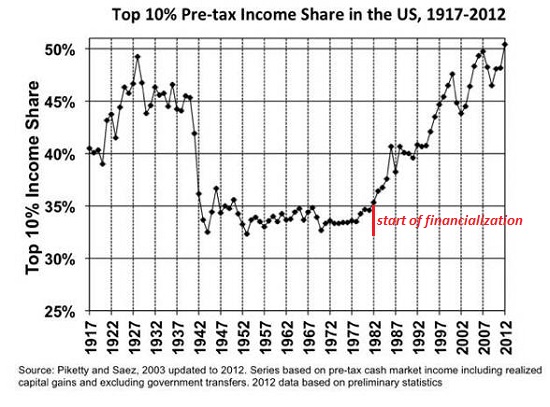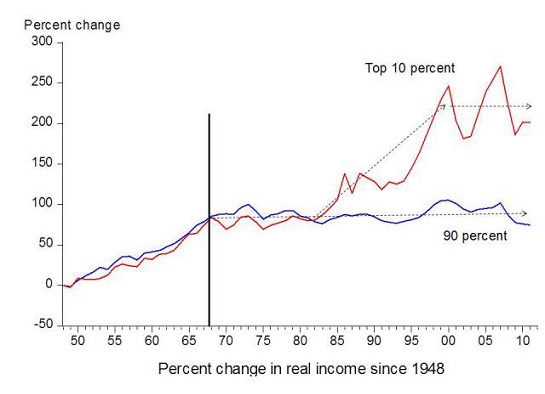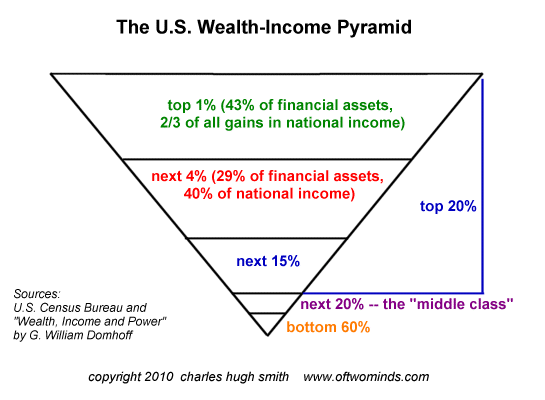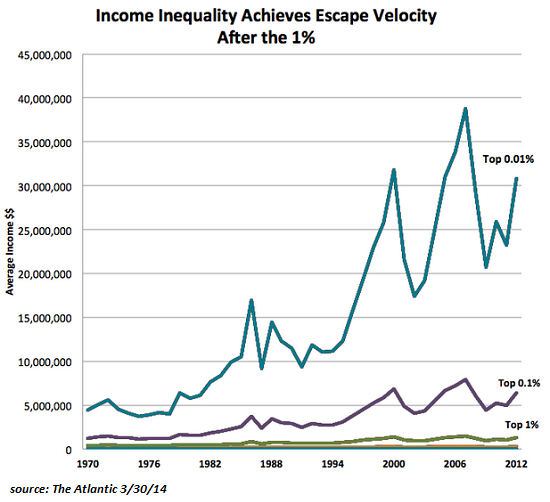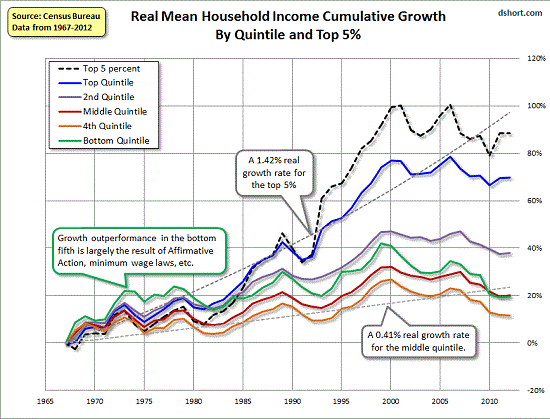Is the top 10% up to the task of borrowing and blowing enough money to prop up a debt and bubble-dependent economy?
Since the entire economy depends on consumption for its "growth," and discretionary consumption is financed with either cash or debt, that leads to two questions: 1) who has cash to spend on non-essentials and 2) who is credit-worthy enough to borrow money for non-essentials?
What makes a household credit-worthy? A) disposable income, i.e. cash left over after servicing debt and paying for essentials, and B) assets that can act as collateral for loans.
Since the top 10% take home 50% of all household income, it follows that this top slice has most of the discretionary cash:
The top 10% is also the only slice whose income has exceeded inflation over the past four decades:
In terms of assets that can serve as collateral, the top 5% own most of the nation's household wealth. So not only do the top 10% earn most of the income, they also own most of the assets that can serve as collateral for loans:
Much has been written recently about the extreme concentration of wealth in the top .1%. The point here is that the top 9.9% may be doing OK, but much of the wealth owned by the top 10% is concentrated in the top .1%.
Since real income for all wage earners has declined since 2007 when adjusted for inflation, we have to ask just how well the top 9.9% is doing in terms of purchasing power.
Can the top .1% prop up the economy with their spending? Yes, they can prop up Maserati sales and buy $10 million vacation condos, but there simply aren't enough super-wealthy to do the job. As for the top 1%, they can prop up the local Porsche dealership and pay dock fees at the yacht club, but there aren't enough of them, either: around 1.5 million qualify as top 1%.
The top 5% households number around 6 million out of 121 million households, but that's not a big enough number to fill every high-end bistro and private school in the nation. So that leaves the top 10%, the 12 million households with half the income and roughly 80% of the assets, with the task of spending enough free cash or credit-money to prop up an economy that depends on serial asset bubbles for massive injections of unearned income.
Is the top 10% up to the task of borrowing and blowing enough money to prop up a debt and bubble-dependent economy? Right now, we're one stock-market-and-housing bubble pop away from finding out if the top 10% will be able and willing to spend, spend, spend once their bubblicious assets are evaporating like mist in Death Valley.
Administrative note: email responses will be near-zero for the next week or two. Thank you for your understanding.
Ever since my first summer job decades ago, I've been chasing financial security. Not win-the-lottery, Bill Gates riches (although it would be nice!), but simply a feeling of financial control. I want my financial worries to if not disappear at least be manageable and comprehensible.
And like most of you, the way I've moved toward my goal has always hinged not just on having a job but a career.
You don't have to be a financial blogger to know that "having a job" and "having a career" do not mean the same thing today as they did when I first started swinging a hammer for a paycheck.
Even the basic concept "getting a job" has changed so radically that jobs--getting and keeping them, and the perceived lack of them--is the number one financial topic among friends, family and for that matter, complete strangers.
It details everything I've verified about employment and the economy, and lays out an action plan to get you employed.
I am proud of this book. It is the culmination of both my practical work experiences and my financial analysis, and it is a useful, practical, and clarifying read.
"I want to thank you for creating your book Get a Job, Build a Real Career and Defy a Bewildering Economy. It is rare to find a person with a mind like yours, who can take a holistic systems view of things without being captured by specific perspectives or agendas. Your contribution to humanity is much appreciated."
Laura Y.
| Thank you, Stephen C. ($60), for your superlatively generous contribution to this site -- I am greatly honored by your steadfast support and readership. | | Thank you, Donald B. ($50), for your extraordinarily generous contribution to this site -- I am greatly honored by your longstanding support and readership. |
